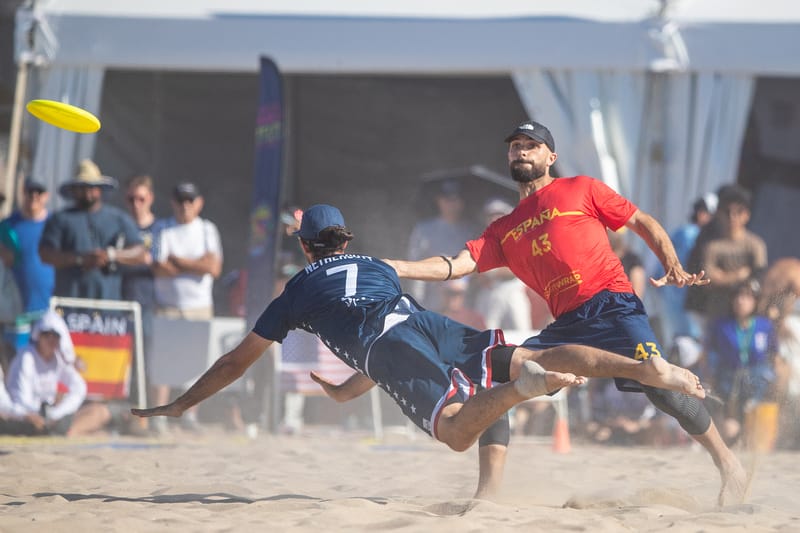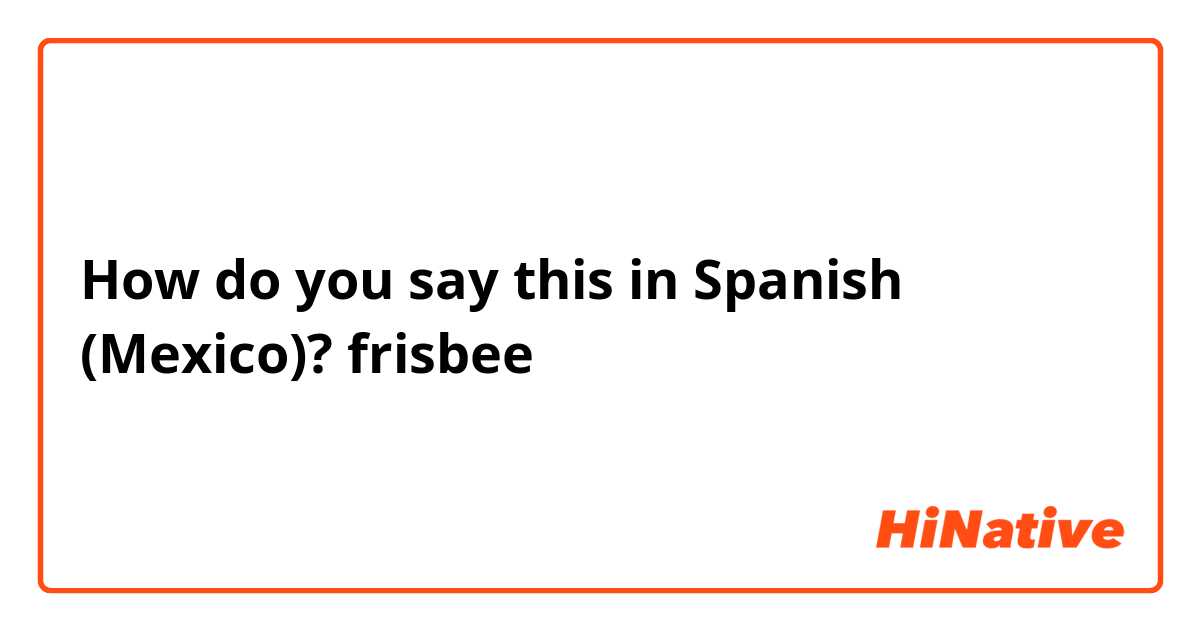The Spanish word for frisbee is “disco volador.” This term translates literally to “flying disc.”
Disc sports enthusiasts and beachgoers across Spanish-speaking countries often enjoy the simple pleasure of tossing a frisbee, or disco volador, under the sun. The activity transcends language barriers and unites people through the shared joy of play. Recognized universally for its iconic shape and the game it represents, the frisbee embodies outdoor fun and physical engagement.
Its popularity has led to professional sports like Ultimate and Disc Golf, which have dedicated followings in many countries, including those where Spanish is the predominant language. Whether used competitively or recreationally, the disco volador remains a beloved aspect of leisure times worldwide.
The Spanish Vocabulary For Outdoor Activities
Exploring the great outdoors invites a world of vocabulary for enthusiasts. In Spanish, terms for outdoor activities pave the way for cultural immersion and fun. Whether throwing a Frisbee at the beach or hiking up serene mountains, knowing the right words enhances the experience.
Frisbee: A Casual Translation
When reaching for a Frisbee on a sunny day, in Spanish, you simply ask for a “disco volador.” This term, translating to “flying disc,” captures the essence and playfulness of the game.
Regional Variations In Spanish-speaking Countries
As with many words, regional nuances affect Frisbee’s Spanish translation. Below, see how diverse countries refer to this popular disc:
- Mexico: Frisbi – A direct adaptation from English.
- Spain: Frisbee – Often used, just like in English.
- Argentina: Disco volador – Emphasizing the action of flight.
Embrace these variations to sound like a local! Outdoor adventures always lead to new words to learn and share.

Credit: www.facebook.com
Origins Of The Frisbee And Its Spanish Identity
The Frisbee is a popular flying disc with a history that soars just like the toy itself. It has become a beloved pastime across the globe, including the Spanish-speaking world. In Spain and many Latin countries, the Frisbee keeps its name but is pronounced with a Spanish accent. Let’s explore the fascinating story behind this versatile disc and its adoption into Hispanic culture.
History Of The Frisbee
The Frisbee’s origins date back to the 1940s in the United States. It was created by Walter Morrison, who initially called it the “Pluto Platter”. However, its name changed after the toy company Wham-O marketed it as the “Frisbee”. The name stuck and spread worldwide.
Frisbees soared into hearts due to their unique flying properties and the skill required to master them. Children and adults alike found joy in tossing the disc around.
Adaptation Into Hispanic Culture
When the Frisbee crossed into Spanish-speaking areas, it brought together family and friends. Communities adopted it, blending it into their local traditions and celebrations. In Spain, you’ll often hear it called “el Frisbee”. In Hispanic culture, Frisbee games emphasize fun, community, and friendly competition.
Frisbee tournaments and clubs started to appear in many Hispanic countries, showing the disc’s universal appeal. The spirit of the game transcends language. People of all ages continue to enjoy it, proving that play has no borders.
Learning Through Play: Teaching Spanish Terms
Welcome to the exciting world of Learning through Play: Teaching Spanish Terms! Have you ever considered how playtime can double as an educational opportunity? Frisbee, a game cherished by all ages, becomes not only fun but also a dynamic way to learn Spanish. In Spanish, Frisbee is called ‘disco volador’, which translates to ‘flying disc’. Let’s dive into how you can introduce this playful pastime into your language lessons.
Incorporating Frisbee Jargon Into Language Classes
Tossing a disco volador around isn’t just fun—it’s a perfect chance to learn. Students can practice saying phrases like ‘Lánzame el Frisbee’ (Throw me the Frisbee) or ‘¡Buena captura!’ (Good catch!). Let’s look at ways to include Frisbee terminology in class:
- Label the Frisbee with Spanish words related to the game.
- Use action verbs in Spanish during the game.
- Practice commands and requests while playing.
Interactive Games For Vocabulary Retention
Playing games that involve Frisbee can boost vocabulary retention. Here are some engaging activities to reinforce new vocabulary:
- Create a Spanish vocabulary scavenger hunt with Frisbees.
- Organize a Frisbee match where commands are given in Spanish.
- Play Simon Says with Frisbee-related actions using Spanish terms.

Credit: ultiworld.com
Cultural Exchange Through Sports
Sports bridge cultures, connecting people across the globe. Language adapts to incorporate this shared passion. Take the word ‘Frisbee‘, a term born from an American pastime, and observe its acceptance and usage in Spanish-speaking countries. Sporting events become platforms for cultural exchange and vocabulary expansion.
Impact Of American Sports On Spanish Vocabulary
Sports from the U.S. like basketball, baseball, and skateboarding have infiltrated international boundaries. Their respective lingo also makes a crossover into different languages. Here’s how ‘Frisbee’ is embraced in the Spanish lexicon:
- In Spanish, people say ‘Frisbee‘ just as in English or sometimes ‘disco volador‘, meaning ‘flying disc’.
- Words like ‘dunk‘ in basketball becomes ‘mate‘ and ‘skateboarding’ translates to ‘monopatín‘.
- New terms often integrate seamlessly, reflecting the popularity and influence of American sports.
Frisbee Tournaments And Hispanic Participation
Hispanics show growing enthusiasm in Frisbee competitions. Events reflect cultural diversity and increase Spanish vocabulary adoption:
| Tournament Name | Hispanic Countries Participating |
|---|---|
| World Frisbee Championship | Mexico, Colombia, Spain |
| Ultimate Frisbee League | Argentina, Venezuela, Chile |
| Beach Ultimate Frisbee | Puerto Rico, Costa Rica, Ecuador |
Through these tournaments, countries engage in language exchange. Terms like ‘handler’ and ‘cutter’ from the Frisbee lexicon are becoming more commonplace in Hispanic nations.
Beyond Translation: Embracing Local Terminology
Embarking on an adventure into the world of Spanish vocabulary, we often stumble upon gems of localized terms. The word “Frisbee” exemplifies how direct translation may not always capture the essence of a term within a cultural context.
When To Use Native Spanish Terms
Understanding when to employ native Spanish terminology can bridge communication gaps. It enriches the conversational tapestry, showing respect for local tongue nuances. Here’s a list of instances where Spanish terms take center stage:
- Local sporting events or casual play in Spanish-speaking regions.
- Conversing with native Spanish speakers about sports.
- When teaching or learning Spanish as a language.
Appreciating Linguistic Diversity In Sports
Sporting names and terms reflect a vast array of linguistic idiosyncrasies. They evoke cultural identity and societal values. Let’s celebrate this rich linguistic diversity within the world of sports by recognizing some popular Spanish terms:
| English Term | Spanish Term |
|---|---|
| Soccer | Fútbol |
| Basketball | Baloncesto |
| Frisbee | Disco volador |

Credit: www.ebuc2019.org
Frequently Asked Questions For How Do You Say Frisbee In Spanish
¿cómo Se Llama El Frisbee En Español?
El frisbee se conoce como “disco volador” en español. Este nombre describe su capacidad de volar al ser lanzado.
¿como No Spanishdict?
SpanishDict offers accurate Spanish translation and learning services. To avoid it, simply don’t visit the website or use its app.
What Is The Spanish Term For Frisbee?
Frisbee is commonly referred to as “frisbee” in Spanish as well. However, in some Spanish-speaking regions, it might also be called “disco volador,” which translates to “flying disc. “
Are There Different Words For Frisbee Across Spanish Regions?
Yes, while “frisbee” is widely understood, regional variations exist. For example, in Spain, some might say “disco volador,” whereas in Latin American countries, “frisbee” is more prevalent.
Conclusion
Exploring new languages broadens our horizons and connects us across cultures. “Disco volador” is your go-to term for ‘Frisbee’ in Spanish, capturing the essence of this flying disc game. So, whether you’re planning a beach day or a park visit, impress your friends with your linguistic prowess and enjoy the universal delight of a Frisbee toss.
¡Vamos a jugar al disco volador!
